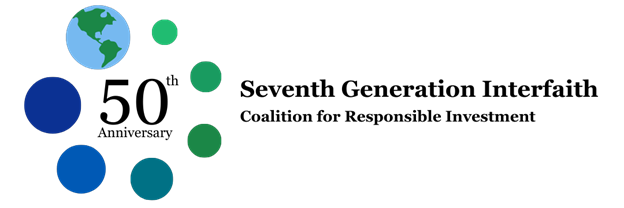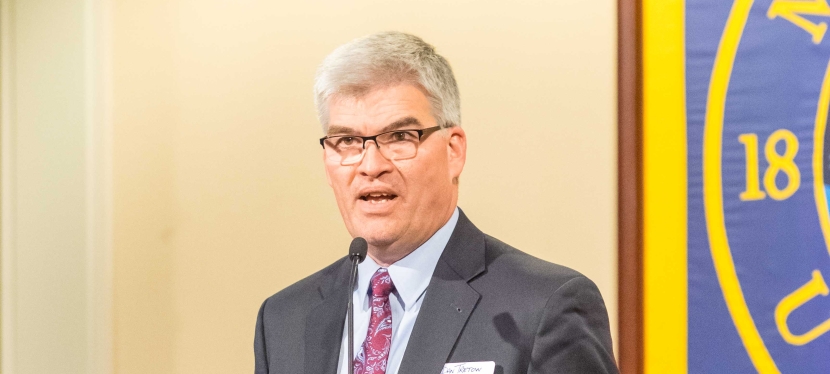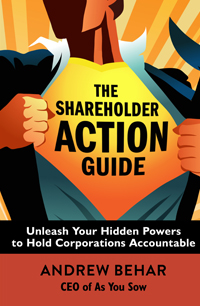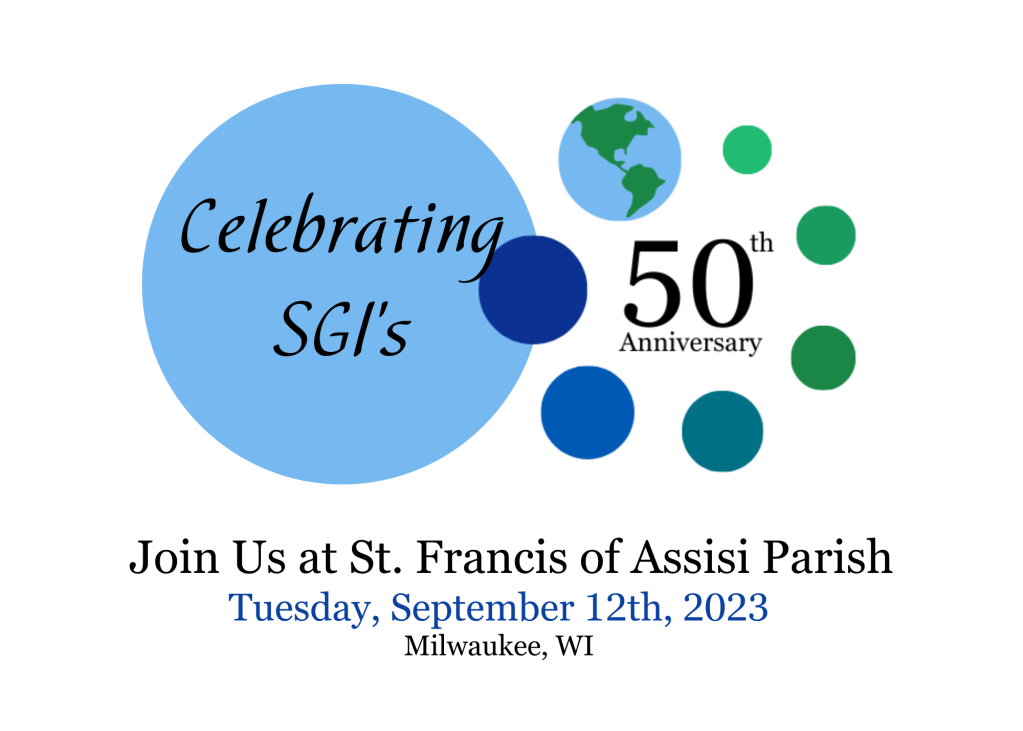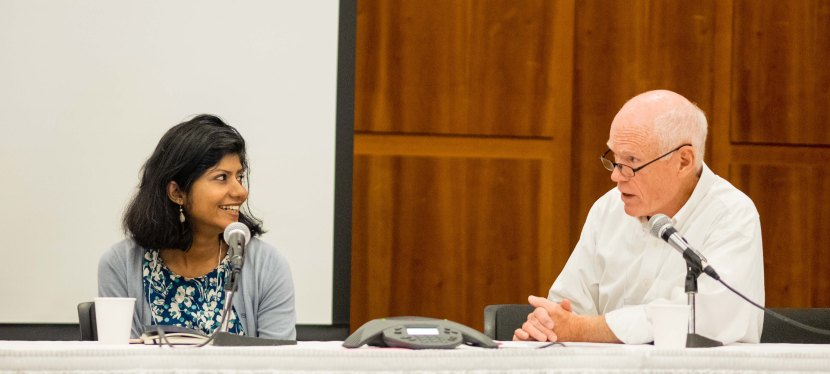By Bennett Freeman
Keynote remarks from the Seventh Generation Interfaith Coalition for Responsible Investment 2022 Conference (October 11, 2022) at Fox Point Lutheran Church in Fox Point, Wisconsin
Thanks to Chris Cox and Frank Sherman for inviting me to address the 2022 SGI Conference. I am delighted to be followed by a panel of four colleagues and friends who are leaders in this field: Pat Zerega, Anita Dorett, Shari Gittleman, and Sam Jones.
Seventh Generation Interfaith’s mission and work—and your faith-based commitment to human rights—is more important and urgent than ever: at a time when the peace of the world has been disrupted by naked aggression and the values of the international community are under attack; at a time when our nation’s democracy has come under assault and our commitment to racial and social justice remains unfulfilled; at a time when even decades of progress in socially and environmentally responsible investment is now not only questioned by skeptics but also confronted by the forces of reaction.
It is a cliché to observe that amidst crisis there is opportunity. But now is such a time of opportunity if we apply our powers of reason to the challenges at hand—and if we keep the faith in our collective mission and work.
Let me describe the broader global context of our theme of corporate human rights in conflict-affected and high-risk areas in ways that I hope will give texture to the challenges we face and help frame the panel discussion. I will focus on challenges facing multinational corporations from both my former responsible investor perspective and broader international relations experience.
Two parallel sets of pressures and expectations, tensions and conflicts, have intensified, converged and in turn challenged multinational corporations:
First, ESG pressures and expectations:
- Pressures and expectations are mounting from a range of stakeholders, especially institutional investors and employees as well as civil society and local communities.
- The historic events of the last two and a half years have sharpened the focus on “S” issues—inequality and racial injustice, labor and human rights—even as the climate crisis intensifies.
- Companies to take stands on controversial social, even political issues (especially not exclusively in the U.S.) as political polarization intensifies.
- A backlash has gained momentum this year (again especially but not exclusively in the U.S.) focused both on ESG investing and “woke capitalism” with decades of progress now on the line.
Second, Geopolitical tensions and conflicts:
- Major democracies have faced challenges of legitimacy and efficacy as some have shown illiberal tendencies that threaten constitutional democracy and undermine civil society/civic space as well as “peace, justice and strong institutions” (in the words of SDG 16) both within and among states.
- Major autocracies have acted with greater impunity as the major democracies became distracted and the international community has at times faced paralysis, both reflecting and reinforcing the degradation of human rights standards, norms and institutions.
- China’s mass incarceration, forced labor, invasive surveillance, religious and cultural desecration of Muslim minorities in Xinjiang has been so severe and systematic that the UN High Commissioner for Human Rights concluded last month “crimes against humanity” may have been committed.
- Russia’s invasion of Ukraine violated the principle of not using force to alter national borders and in the ensuing carnage has killed thousands of civilians, committed war crimes and at the same time has not only destroyed much of Ukraine’s infrastructure but also disrupted the global economy.
What is new is not only the parallel, concurrent intensification of both ESG pressures and expectations, geopolitical tensions and conflicts but also the convergence of these pressures and expectations, tensions and conflicts.
This convergence has forced many multinational corporations and institutional investors to weigh tough trade-offs, make hard choices and take public stand in these four situations:
- U.S. democratic stability and legitimacy—unprecedented intervention by Corporate America/Wall Street before and after the November 2020 presidential election to support a peaceful transfer of power followed by condemnation of the January 6 insurrection and support for voting rights.
- But dilemmas: taking what may appear to be partisan stands; acting to stem systemic risk for the U.S. economy and global financial system; accepting responsibility to protect American democracy as a cornerstone of the international rules-based order.
- China/Xinjiang—unprecedented decoupling from Xinjiang cotton suppliers by western apparel brands, now required of U.S. companies and those exporting into the U.S. market by the UFLPA.
- But dilemmas: willing to make statements as well as take actions; responsibility for employee security in China; balancing commercial interests and ethical values, profits and principles in the world’s largest economy/consumer market.
- Russia/Ukraine—unprecedented exit of western companies (not just those subject to sectoral sanctions by home country governments) from Russia almost immediately following the invasion.
- But dilemmas: few companies willing to offer explicit principled, human rights-related rationales for exits; determination of a potential basis to reenter a post-conflict Russia; precedent for other potential situations and scenarios, especially involving China (and a possible attack on Taiwan)
- Burma/Myanmar—unprecedented brutality by the military dictatorship over the last 20 months since the coup in early February last year followed by the exit of some major multinationals that established operations with the lifting of sanctions and the transition to democracy a decade ago
- But dilemmas: stay or go; balancing a disinclination to enable the regime through revenue or resources with a commitment to local employees and stakeholders; weighing the elements of “responsible exit” that respect human rights/humanitarian considerations and consequences.
The trade-offs weighed, choices made and stands taken are not easy for multinationals and investors. They all present dilemmas—commercial and political—that challenge roles and responsibilities of companies and investors. Some of these dilemmas result in zero-sum—not win-win—outcomes that may divide companies’ shareholders and stakeholders, home and host governments.
At stake for multinational corporations and institutional investors is no less than the continuity and efficacy of the rules-based international order on which they fundamentally depend, even if not always acknowledged and embraced. Individual companies and entire industries share a stake in defending and supporting this order at a time when its stability and even legitimacy face severe challenges—and with the global economy and the international community under severe stress.
Human Rights Due Diligence:
I have identified and described these two parallel, converging sets of factors and forces facing multinational corporations: ESG pressures and expectations; geopolitical tensions and conflicts.
Human rights due diligence (HRDD) sits precisely at this convergence of ESG and geopolitical issues. HRDD is an analytical framework and operational approach that has gained traction and momentum over the years, especially in recent months:
- HRDD’s foundations and precedents—including in conflict and high-risk settings— extend back over two decades to the Voluntary Principles on Security and Human Rights (2000) and the first-ever HRIA commissioned by any company in any industry by BP for the Tangguh LNG project (2002).
- HRDD was consolidated and elevated during the two Ruggie mandates (2005-08 and 2008-11), culminating in the Guiding Principles on Business and Human Rights (UNGPs) and have ever since become the driving force in the field and emerging priority for ESG investors.
Plus, significant work has been spurred by the Russian invasion of Ukraine and undertaken by:
- Business and Hunan Rights Resource Centre (BHRRC) published in the early weeks of the war two timely and useful papers: Advancing business respect for human rights in conflict-affected areas through the UNGPOs; Why conflict must be included in mandatory due diligence laws. The Resource Centre also actively tracks the decisions and actions of international companies to exit Russia whether fully, incompletely or not at all.
- The Investor Alliance for Human Rights (IAHR) has highlighted conflict risk tools to manage related investment and human rights risks and plays an active role in the new Business for Ukraine (B4U) Coalition together with the Heartland Initiative.
- The Heartland Initiative has emerged over the last half dozen years as the most visible and influential voice and force in mobilizing responsible investors to address human rights in conflict zones. It is also a co-founder and critical driver of the new Business for Ukraine (B4U) Coalition since its inception early this spring and formal launch in mid-summer.
- Business for Ukraine (B4Ukraine) called in its Declaration for the foreign companies that have exited Russia to remain out until the conflict is resolved on terms acceptable to an independent, sovereign, democratic Ukraine—and called on companies still partly or fully operating in Russia to leave completely. The Declaration also pointedly called on companies claiming that they remain in Russia to deliver “essential services” to undertake and disclose HRDD to try to justify their stance up against a very high bar of expectation that they exit fully. Companies that have exited are also called on to undertake human rights due diligence to determine whether, when and in what form they may return to a post-conflict—or better a post-Putin—Russia.
Russia’s attack on Ukraine is giving fresh impetus to mandatory HRDD, which in turn is gaining traction and momentum through the EU and beyond. The current political and legislative outlook in the U.S. is conducive only to incremental issue-by-issue progress. Yet we have salvaged Dodd-Frank sections 1502 (conflict minerals) and 1504 (extractive revenue transparency), so there is a basis on which to build while the SEC in the meantime focuses productively on climate-focused disclosure.
Yet HRDD is a stepping-stone to a broader sensibility that should inform our engagement with multinational corporations and large institutional investors alike. The Russia-Ukraine war should encourage a fusion of what they have already known and done for decades—political and geopolitical risk analysis— with the human HRDD that they know and do far less. In my experience working with multinational corporations and institutional investors, I have learned that progress can be made at a pivot point that lies part or mid-way between where they are and where we want them to be. The convergence of political and geopolitical risk analysis with HRDD strikes me as such a pivot point.
Russia’s attack on Ukraine is also giving impetus to a new notion that an even greater responsibility is at stake. The B4U Declaration hit it on the head: “Russia’s attack on Ukraine is an attack on the rules-based international order” on which both the global economy and the international community depend. Multinational corporations have been among the greatest beneficiaries of that international rule-based order over the last three-quarters of a century since its creation amidst the ashes of WWII. Yet at times they appear to take its existence for granted when their trade and investment, innovation and entrepreneurship, markets and customers, all depend on its continuity and vitality. That was at times apparent in the U.S. during the previous Administration when the occupant of the Oval Office appeared neither to understand nor to accept the international community nor many rules of any kind.
I believe that the time has come for companies and investors to explicitly support and defend not only democracy here at home but also the international rules-based order aboard. Support for the rules, norms and institutions of American democracy and support for the rules, norms and institutions of the international community are—pardon the cliché—two sides of the same coin that are indeed necessarily complementary and mutually-reinforcing.
Indeed, support for the international rules-based order may point to a new geopolitical corporate responsibility. While indeed idealistic, it can be activated as a pragmatic agenda that can help multinational corporations and institutional investors address the dilemmas inherent in this convergence of intensified ESG pressures and tensions with geopolitical tensions and conflicts.
Companies and investors can and should:
- Avoid situations where they cause, contribute or are directly linked to human rights abuses through the UNGPs and heightened human rights due diligence (HRDD)
- Advocate for the “shared space” of the rule of law, accountable governance and civic freedoms.
- Demonstrate a sustained commitment to enhance equity, transparency and accountability.
- Diminish inequality by tackling poverty and ensuring sustainability by arresting the climate crisis.
The elements of this agenda are not entirely or even mostly new, having emerged over the last decade. But while embraced to varying extents by leading companies, none are implemented with the priority and urgency necessary to address the global problems and opportunities that underly them. Moving this agenda forward could bring incremental progress element by element, but transformational progress if moved forward with that priority and urgency.
Yet this rules-based order has faced its own contradictions as some of its original architects and longstanding champions (including the U.S. and UK) have been among those states which have transgressed the sovereignty of others without full support of the international community through the UN (as with the 2003 invasion of Iraq). Moreover, the international rules-based order is perceived by many in the Global South as inherently western despite its universal aspirations and applications.
Finally—to add a further complication and intensification of the dilemmas that multinationals face—the ESG agenda has come under challenge, even attack, especially in recent months in the U.S. The debate extends from the methodological and technical aspects of ESG metrics and investing to the ideological and indeed political underpinnings of the entire corporate responsibility, accountability and sustainability agenda as it has evolved over the last two decades.
The ESG agenda is now on the defensive exactly at a time when we must be on the offensive to meet both the crises and opportunities we face. Let me briefly describe the two distinct prongs that have converged to put the ESG agenda on trial:
The challenge: methodological and technical; valid issues that are critical to acknowledge and address.
- Data consistency and comparability must be improved; metrics must be clarified, and standards must be aligned; corporate green-washing, blue-washing and white-washing must be exposed and expunged; portfolio construction and fund names must be subjected to the same degree of transparency and accountability as their holdings.
- We must fix these problems and if we do not rise to this challenge, we will lose the credibility and legitimacy to withstand the more fundamental attack that is the real agenda for some of the ESG critics who are less interested in methodology and more interested in ideology.
The attack: ideological and political; fundamental differences that are essential to counter even if they cannot be entirely reconciled.
- The attack is not only on ESG investing but also on “woke capitalism”—the distorted, pejorative epithet applied to the agenda that has moved forward—incompletely but progressively—over those last two decades. The attackers would take us back half a century to Milton Friedman who infamously but influentially asserted that “there is one and only one social responsibility of business—to use its resources and engage in activities designed to increase its profits.” Half a century may be an understatement; even Milton Friedman accepted the need for basic regulation of business. The attack on ESG—as distinct from the challenge to how ESG is defined and implemented—would take us back to a crude world of markets over people, of private interests over public values, of unfettered capitalism over accountable democracy.
- We must see the attack for what it is and the stakes for what they are: the role of responsible business and investment in shaping the kind of society and economy, country and world, that we want and that we work so hard to create.
As we undertake human rights risk assessment and due diligence—especially in conflict-affected and high-risk areas—let us do our research and analysis with probity and consistency. But let us not forget that our business is not just minimizing risk to companies and industries, to portfolios and fiduciaries. Let us remember that our business is protecting and promoting rights, saving and lifting lives.
Let me end with my favorite line in the quarter century history of the contemporary business and human rights field. The late great Sir Geoffrey Chandler, former Shell executive and then founder of the Amnesty International UK Business and Human Rights Group, made the business case for human rights more persuasively than anyone in the Nineties. But he was fond of saying “to hell with the business case, it’s about doing the right thing.” Sir Geoffrey was right then and he remains right now.
Keep the faith and thank you.
A PDF of these remarks is available here. Full coverage of the conference is available here, including video from the conference.

